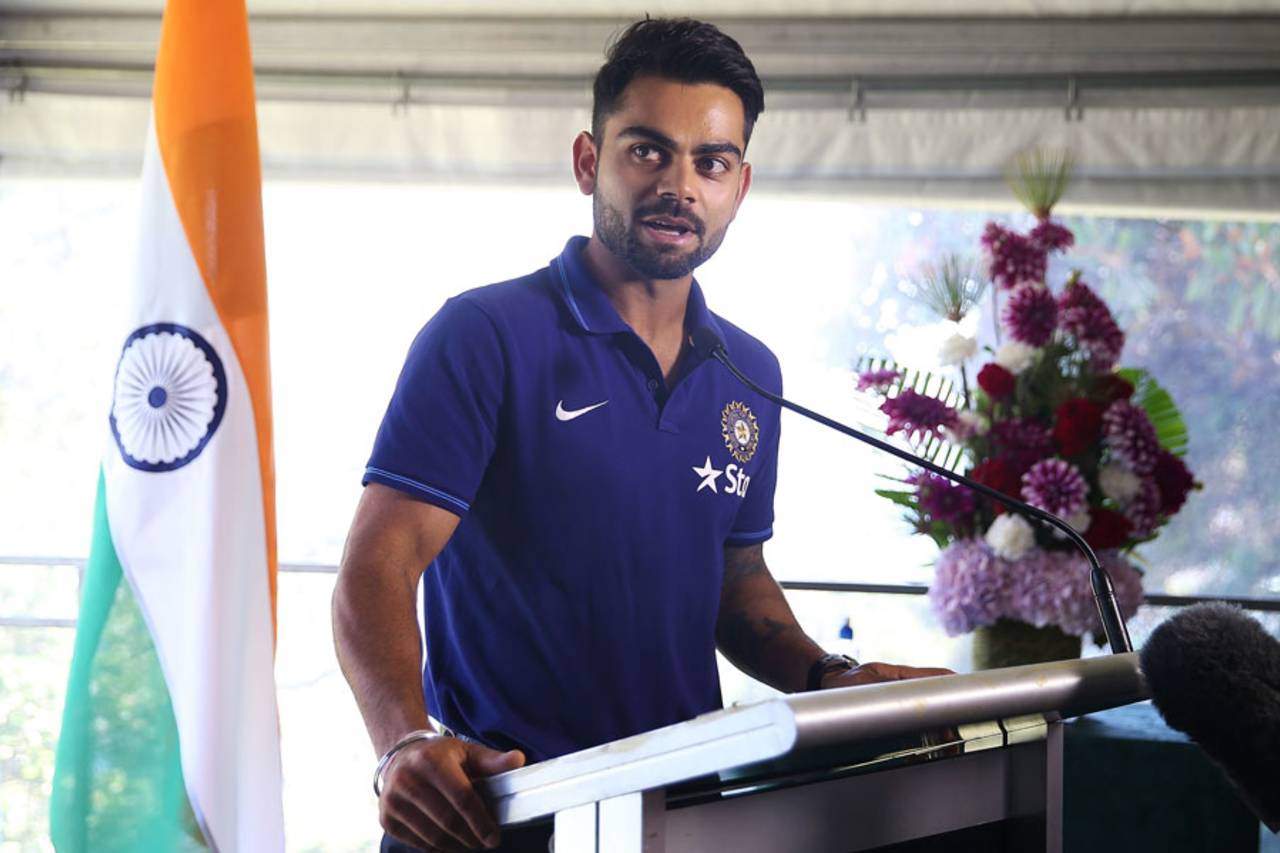Down under,
Virat Kohli is certainly talking the talk. And given that he has scored three centuries in the current Test series, one is tempted, as I certainly was a couple of days ago, to say that he is walking the walk too.
But that was too hasty a judgement, made entirely on the basis of having cast only a superficial glance at the scoreboard at the end of the third day of the
third Test, where India were 462 for 8 in response to Australia's 530. India had made a fight of it. That's all that seemed to matter.
A closer look at the scoreboard was more disquieting. Kohli and Ajinkya Rahane had put on 262 runs in a little under 58 overs, taking India to 409 for 3. With 20 overs to go on the third day, India were 121 runs behind with seven wickets in hand. By close of play India had subsided to 462 for 8. Kohli was out to Mitchell Johnson, after having taunted and thrashed him all day. Rather than carrying on the next day, and taking India closer to Australia's score, Kohli was gone. India's tail was still to come. It came and went, predictably enough making few runs, eating up little time. So did India's bowling, which once again let Australia set India an awkward target on the last day.
For all of India's aggression, both cricketing and verbal, earlier in the day, defeat was still on the cards. That night, as Kohli
waxed eloquent about how he didn't care to respect those who didn't respect him, an eminently reasonably statement to make in most circumstances, he should have been a trifle more cognizant of the scoreboard. To reiterate: when all - "banter" and "sledging" alike - was said and done, and all the sporting statements made by India's younger brigade were accounted for, Australia still looked like the team that had the best chance to win.
Talking is always best done in the aftermath or anticipation of victory. Not when making note of a "fightback" or a "brave fight" or a "display of aggression" or when recounting tales of settling personal scores or establishing personal pecking orders. The best cricketing aggression is that displayed by a W in the results column. Kohli, of course, knows this - for he acknowledged that Steven Smith was justified in talking as he was at his press conferences, because, wait for it, he was 2-0 up in the series. He knows it - but he hasn't quite internalised this piece of wisdom yet.
During the second Test, VVS Laxman tweeted:
Surprisingly Laxman didn't go on to finish the statement of the thesis he had begun to advance. India's sledges were "unnecessary" and "foolish" precisely because the bowlers didn't bowl well (not just "2 Mitch" but to everyone else). Even worse, India failed to win the Test. Had they won, Indian sledging would have been evidence of a "refreshing new aggression" - maybe even visible proof a "new India was on the rise".
Victory, as every generation, whether sporting or otherwise, finds out sooner or later, retrospectively justifies a great deal; "aggression" and "sledging" and "banter" are justifiable and defensible when they lead to wins.
Australian cricketers can continue to regale us with incoherent tales about how they deploy something called "mental disintegration" and effortlessly stay just this side of a mysteriously unspecified line, mostly because they win quite often. Winners, in all walks of life, but especially sporting ones, are privileged enough to be able to offer us all manner of mysterious causal analysis about their victories; they can be used to validate many different kinds of theoretical frameworks (in cricket: the two-nation theory, particular and peculiar cultures of male friendship, pop-psychological theories of human motivation, and so on). Sometimes we are told dressing-room spirit had something to do with winning. Sometimes it is captaincy; sometimes it is discipline; sometimes it is nationalism and pride. The explanatory degrees of freedom in analysing a winning team, whether as journalist or player, are indeed considerable.
Kohli should talk on the field all he wants - provided he stays this side of "the line", of course - but if he doesn't win a Test, he shouldn't talk about his on-field adventures. When he does win - preferably a series overseas - he should feel free to integrate his verbal contretemps into an elaborate explanation of why his team won. For good measure, he could call a press conference and claim success was achieved due to ancient Indian techniques of mind control, comprehensible only to those fluent in Sanskrit and well-versed in the arts of meditation and technical hermeneutics. If he continues to win, he might be pleasantly surprised to see himself deemed a sage. Rather than a "spoilt brat".
Kohli likes mixing it up with the Australians. He likes scoring runs, he likes winning matches. He will soon realise, once he starts winning games, that the best talking about on-field verbal encounters happens after the cricket has concluded, and he can relax and giggle at his opponents' fury and mealy-mouthed excuses for losing and point to the scorecard instead. Where his ample scores currently reside, next to a 0-2 scoreline for India.
Samir Chopra lives in Brooklyn and teaches Philosophy at the City University of New York. @EyeonthePitch
